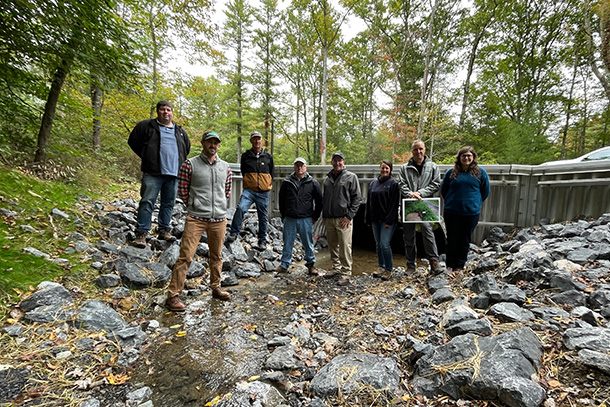
Representatives toured three sites that benefited from the Dirt, Gravel and Low Volume Roads Program (DGLVR Program). From left to right: Justin Challenger, State Conservation Commission (SCC); Carey Lightner, Huntingdon County Conservation District; Roy Richardson, SCC, DGLVR Program coordinator; Karl Brown, SCC, executive director; Russell Redding, Pennsylvania Secretary of Agriculture; Celina Seftas, Huntingdon County Conservation District, manager; Steve Bloser, director of the Penn State Center for Dirt and Gravel Road Studies; and Sherri Law, SCC. Credit: Pennsylvania Department of Agriculture. All Rights Reserved.
Q&A with Pennsylvania Department of Agriculture Secretary Russell Redding
Steve Bloser, director of Penn State’s Center for Dirt and Gravel Road Studies, discusses 25 years of the Dirt, Gravel, and Low Volume Roads Program with Secretary Redding
October 21, 2022
UNIVERSITY PARK, Pa. — Pennsylvania Secretary of Agriculture Russell Redding toured three road improvement projects on Oct. 4 to recognize 25 years of the Pennsylvania Dirt, Gravel, and Low Volume Roads Program (DGLVRP).
Established in 1997, the program funds projects that aim to improve environmental conditions on public roads in the commonwealth. The Pennsylvania State Conservation Commission, under the Department of Agriculture and the Department of Environmental Protection, administers $28 million of this funding, which includes contracting the Penn State Center for Dirt and Gravel Road Studies — housed in the Larson Transportation Institute in the College of Engineering — to provide education, outreach and technical assistance. According to Redding, this collaboration helps lead to cleaner water, healthier soil and better roads for the region.
To commemorate the milestone, representatives from the commonwealth’s Department of Agriculture gathered in Huntingdon County to tour three projects completed by the DGLVRP and the Huntingdon County Conservation District. Located about 25 minutes from University Park, the projects each demonstrate how different practices related to increasing longevity, improving surfaces, and replacing a stream crossing were implemented.
Steve Bloser, director of the center, spoke with Redding about the collaboration, the work completed so far, and what the future holds.
Steve Bloser (SB): We know the DGVLRP benefited the commonwealth over the last 25 years, in terms of improving public roads and water quality, often in rural areas. How do you think Penn State and the center have helped support the program?
Secretary Redding (SR): This partnership has been vital to commonwealth efforts to clean up waterways and improve rural roads in Pennsylvania. One of the primary roles of the center is to provide technical assistance in planning and implementing environmentally sensitive maintenance (ESM) practices on rural public roads. The center has provided more than 1,600 of these visits since 2015. The center also provides the two-day ESM training that potential applicants are required to attend to apply for DGLVRP funding.
From January 2018 to June 2022 (4.5 years), there have been 1,350 technical assistance visits and 3,200 ESM certifications. That’s a lot of work completed, with much more to be done in the future.
SB: Why is education and outreach on roads at the local level important? What is the best outcome you hope we can achieve through this work?
SR: You can’t recognize and address what you don’t know is an issue. That’s why education and outreach is critical. Through the program, support and resources about ESM practices are shared to help improve roads, improve stream health, and reduce road maintenance costs. ESM practices slow down and spread out stormwater, so it doesn’t wash road materials into local waters. We’ve seen that education and outreach directly leads to more involvement in the program, which results in the implementation of high-quality projects. Education equips local road owners with the knowledge they need to improve maintenance practices on their roads.
The best outcome is local engagement to protect our waterways and our communities. The goal is to help public road owners confidently maintain their dirt, gravel and low traffic volume paved roads in a way that protects water quality and reduces maintenance needs, ultimately stretching public dollars.
SB: What are the goals for the program over the next 25 years? How do you envision Penn State’s involvement?
SR: The goal for the future for the program is to continue learning about and improving the ESM practices that are implemented and to grow the program by reaching more public road owners in Pennsylvania. The partnership between the State Conservation Commission and the center, with the support from Gov. Wolf and the General Assembly, has allowed the program to grow from an initial investment of $4 million a year to $28 million per year. Without Penn State’s Center for Dirt and Gravel Road Studies’ support in education and technical assistance, the program would not be where it is today.
SB: If Pennsylvania residents only remember one thing about the DGLVR Program, what should that be?
SR: The program strives to improve local dirt, gravel and low volume paved roads throughout the state. Although low traffic, these roads are important to the loggers, farmers and residents of rural Pennsylvania. These roads often impact streams, and the program strives to improve the roadway with ESM practices that improve nearby stream health and reduce overall road maintenance needs and costs. All in all, the program results in better roads and cleaner streams — and we’re happy to see the progress being made through essential partnerships and coordinated efforts. And we’re looking forward to the progress we’ll make down the road.



